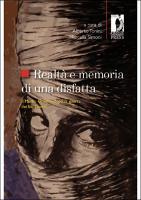Realtà e memoria di una disfatta
Il Medio Oriente dopo la guerra dei Sei Giorni
| dc.contributor.editor | TONINI, Alberto | |
| dc.contributor.editor | Simoni, Marcella | |
| dc.date.accessioned | 2022-05-31T10:16:15Z | |
| dc.date.available | 2022-05-31T10:16:15Z | |
| dc.date.issued | 2010 | |
| dc.identifier | ONIX_20220531_9788884539526_183 | |
| dc.identifier | OCN: 776986018 | |
| dc.identifier.issn | 2704-5919 | |
| dc.identifier.uri | https://library.oapen.org/handle/20.500.12657/54899 | |
| dc.language | Italian | |
| dc.relation.ispartofseries | Studi e saggi | |
| dc.subject.other | Storia contemporanea | |
| dc.subject.other | Guerra dei Sei Giorni | |
| dc.subject.other | Medio Oriente | |
| dc.title | Realtà e memoria di una disfatta | |
| dc.title.alternative | Il Medio Oriente dopo la guerra dei Sei Giorni | |
| dc.type | book | |
| oapen.abstract.otherlanguage | Realtà e memoria di una disfatta does not address either the causes of the Six Day War or the consequences that the military conflict had for Israelis and Palestinians, about which much has been written. It focuses instead on the impact of the war on Arab countries, and the weighty legacy left by the defeat of 1967, which has been much less studied. There are several references to this in the short essay by Samir Kassir, L'infelicità araba, published posthumously in Italy in 2006. In his analysis, Kassir warns against falling into the dual trap that has ensnared the Arab world for the last forty years: on the one hand the Orientalist reading that lays the blame on Islam for the delayed modernisation of this part of the world, and on the other the temptation to heap responsibility for all evils on the West. To avoid this risk, as Kassir sees it, the Arabs have to take their destiny into their own hands, shrugging off victimism and coming to terms with modernity. | |
| oapen.identifier.doi | 10.36253/978-88-8453-952-6 | |
| oapen.relation.isPublishedBy | bf65d21a-78e5-4ba2-983a-dbfa90962870 | |
| oapen.relation.isbn | 9788884539526 | |
| oapen.relation.isbn | 9788855188913 | |
| oapen.relation.isbn | 9788884539786 | |
| oapen.series.number | 93 | |
| oapen.pages | 248 | |
| oapen.place.publication | Firenze |

